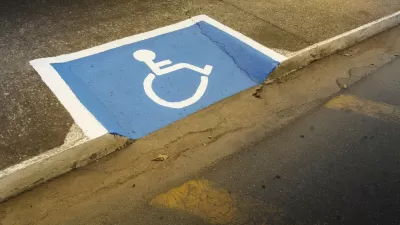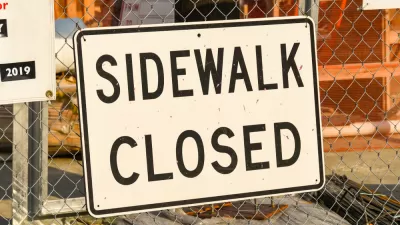The city of Seattle has finally been compelled to maintain pedestrian infrastructure in keeping with the Americans with Disabilities Act.
Ryan Packer reports that the city of Seattle settled a class action lawsuit in U.S. District court alleging that the city is violating the Americans with Disabilities Act, "based on the current number of intersections that are lacking proper curb ramps and the fact that many intersections have curb cuts that are substandard."
"Under the settlement, the Seattle Department of Transportation (SDOT) will be required to build 1,250 curb ramps every single year, adding up to a commitment to install 22,500 over the next 18 years," reports Packer. That pace will double the city's total number of curb cuts by the year 2035.
The article digs much deeper into the subject of curb cuts, their costs, and the lack of political will to construct the important feature of complete streets infrastructure (shown to benefit broad cross sections of the public). The court decision will also impact the spending allotments made from the Move Seattle levy, as approved by voters in November 2015 and planned in the draft Pedestrian Master Plan released in March 2017.
FULL STORY: Disability Rights Victory Means Curb Cut Deluge Coming

Planetizen Federal Action Tracker
A weekly monitor of how Trump’s orders and actions are impacting planners and planning in America.

Map: Where Senate Republicans Want to Sell Your Public Lands
For public land advocates, the Senate Republicans’ proposal to sell millions of acres of public land in the West is “the biggest fight of their careers.”

Restaurant Patios Were a Pandemic Win — Why Were They so Hard to Keep?
Social distancing requirements and changes in travel patterns prompted cities to pilot new uses for street and sidewalk space. Then it got complicated.

Platform Pilsner: Vancouver Transit Agency Releases... a Beer?
TransLink will receive a portion of every sale of the four-pack.

Toronto Weighs Cheaper Transit, Parking Hikes for Major Events
Special event rates would take effect during large festivals, sports games and concerts to ‘discourage driving, manage congestion and free up space for transit.”

Berlin to Consider Car-Free Zone Larger Than Manhattan
The area bound by the 22-mile Ringbahn would still allow 12 uses of a private automobile per year per person, and several other exemptions.
Urban Design for Planners 1: Software Tools
This six-course series explores essential urban design concepts using open source software and equips planners with the tools they need to participate fully in the urban design process.
Planning for Universal Design
Learn the tools for implementing Universal Design in planning regulations.
Heyer Gruel & Associates PA
JM Goldson LLC
Custer County Colorado
City of Camden Redevelopment Agency
City of Astoria
Transportation Research & Education Center (TREC) at Portland State University
Camden Redevelopment Agency
City of Claremont
Municipality of Princeton (NJ)





























